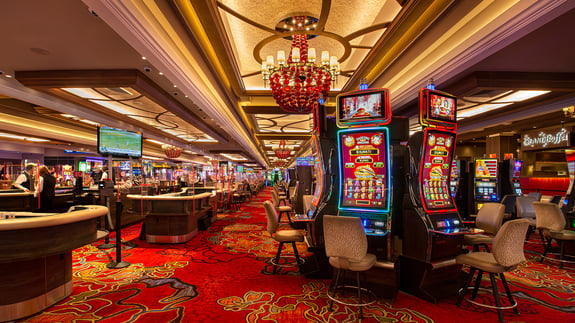
Gambling games have long captured the interest of people around the globe, becoming an integral part of both leisure and culture. From the glimmering lights of Nevada to the captivating experience of virtual casinos, these games evoke excitement, uncertainty, and sometimes even a sense of sentimentality. They are more than just pastimes; they have woven themselves into the tapestry of our lives, influencing everything from cinema and melodies to clothing and literature.
The charm of casino games goes beyond the gambling aspect, tapping into wider themes of luck, risk, and psychology. As players gather around a gaming table or rotate the roulette wheel, they engage in an age-old ritual that resonates with our collective desire for thrill and unpredictability. This obsession has led to the emergence of numerous references in cinema, music, and gaming, showcasing how deeply entrenched these games are in mainstream culture. Whether it is the high-stakes tension of a legendary heist movie or the vibrant nightlife portrayed in music videos, casino games have created a substantial place that reflects our relationship with risk and reward.
Social Impact of Gambling Activities
Gambling games have played a pivotal role in social contexts throughout the ages. Stemming from old societies, forms of chance were often linked to ceremonies or events. For example, early forms of these activities can be traced back to ancient China and the Romans, where die games and betting on outcomes were popular pastimes. These activities not only served as leisure but also as methods of connecting people, facilitating relationships among individuals within societies.
As societies evolved, so did the sophistication and organization of gambling games. The creation of official casinos in the 17th century, particularly in Italy, marked a significant shift in how games were perceived and organized. With specific spaces for gaming, the casino became a community center where patrons from different backgrounds convened. This evolution contributed to the legitimization of gambling, transforming it from a mere pastime into an established industry that shaped the economy and policy.
The impact of casino activities on popular culture cannot be overlooked. As they were popularized in books and film, games such as poker and 21 became icons of chance, chance, and tactics. bakar 69 Iconic figures and stories have developed around these games, illustrating societal views towards luck, wealth, and immorality. This fascination with gambling games has infiltrated various forms of entertainment, solidifying their status in the public imagination and linking them to wider cultural stories throughout history.
Portrayal of Casino Games in Entertainment
Casino games have long been a popular theme in various forms of media, reflecting both the excitement and nuances of gambling culture. Movies such as Ocean’s Eleven and Casino Royale portray characters who navigate intense situations, showcasing not only the attractiveness of the gambling environment but also the tactics and judgments that come with playing popular games like Texas Hold’em and blackjack. These films often dramatize the exhilaration of winning and the potential results of losing, encapsulating the risks involved in gambling.
TV programs have also explored the realm of gambling activities, often integrating them into the plot as a setting for character arcs and conflict. Shows like Vegas depict the stories of casino workers and casino-goers, highlighting the dynamic, often chaotic energy of the casino floor. Reality shows featuring high-stakes gambling competitions further emphasize the appeal of gambling activities, drawing viewers into the drama and strategy involved in each session. Through these depictions, media not only amuses but also stimulates conversations about luck, skill, and the essence of randomness.
Digital games have increasingly integrated casino games into their structure, allowing players to simulate the thrill of gambling without financial exposure. Games within the domain of online gaming often include online slot machines, poker, and other popular casino games, creating an immersive gameplay that mirrors traditional gambling. These digital representations make casino games accessible to a worldwide viewer base, appealing to both gamblers and those who enjoy the rush of virtual experiences. As a outcome, the representation of casino games in entertainment continues to shape cultural attitudes and importance, highlighting their function in entertainment and culture.
Impact of Gambling Activities on Society
Gambling activities have a meaningful impact on society, influencing multiple aspects of societal norms and interpersonal behavior. They often function as a platform for social interaction, where people gather to enjoy a common activity. Game nights with friends or visits to casinos become group events that foster connections and create memories. This communal aspect boosts the entertainment value of casino games, making them a favored choice for celebrations and leisure activities.
Moreover, gambling activities have been portrayed in countless movies, TV series, and literature, shaping perceptions and attitudes towards gaming and gaming. Icons like James Bond competing in baccarat or the intense poker scenes in films have embedded these games in the collective imagination. This depiction often idealizes the lifestyle associated with gambling, attracting new players and influencing trends in both style and behavior. These portrayals can ignite curiosity and lead to a more profound exploration of the nuances of gaming.
Nonetheless, there are also negative consequences associated with the widespread appeal of casino games. The temptation of quick monetary gain can lead to problem gambling and economic troubles for some individuals. The community must grapple with these issues, advocating for responsible gambling and education of the dangers involved. Finding a balance between the fun aspect of casino games with the risks is vital to ensure that they continue to be a positive aspect of our societal fabric.